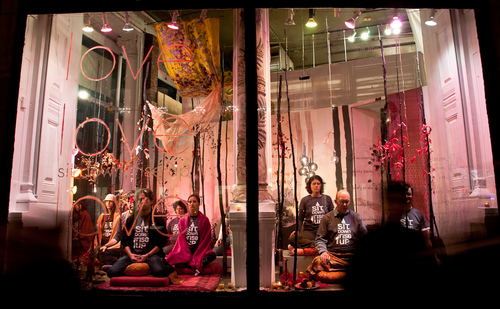Before Siddhartha Gautama attained enlightenment at age 35 he was a
confused twenty and thirty-something looking to learn how to live a
spiritual life. He had an overbearing dad, expectations for what he was
supposed to do
with his life, drinks were flowing, lutes were playing, and the
women were all about him. Some called him L.L. Cool S. I imagine
close friends just referred to him as Sid.
Many people look to Siddhartha as an example of someone who attained nirvana, a buddha. But here we look at a younger Sid
as a confused guy struggling with his daily life. What would he do as a
young person trying to find love, cheap drinks, and fun in a city like
New York? How would he combine Buddhism and dating? We all make mistakes on our spiritual journey; here is where
they’re discussed.
Each week I’ll take on a new question and
give some advice based on what I think Sid, a confused guy working on
his spiritual life in a world of major distraction, would do. Because
let’s face it, you and I are Sid.
Have a question for this weekly column? E-mail it here and Lodro will probably get to it!
—————————————————————————————————————————————
I recently got into a car accident while riding in a taxi cab. I’m okay physically but now every time I’m out with people and they want to take a taxi I experience incredible fear. I don’t want this fear to prevent me from doing this ordinary activity; I live in NYC and want to get over this. What would Sid advise? – Anxious in Manhattan
Fear is rampant in our society of late. Yesterday a graduation ceremony turned into a massacre in Fort Hood. As I sat down to address this question it appears there has been another tragedy, this time a shooting in Orlando. Both of these incidents include people going about their daily routine. Both include that routine being penetrated by fear and disaster.
We never know when fear will arise in our life. On one end of the spectrum there’s the fear of public speaking while on the other there’s the fear of our own death. Some people even enjoy inviting fear into their life by doing things like going out to see a scary movie (Paranormal Activity anyone?).
The conclusive lines of Chogyam Trungpa Rinpoche’s poem Timely Rain read,
“In the garden of gentle sanity,
May you be bombarded by coconuts of wakefulness.”
I don’t think Trungpa Rinpoche is wishing ill on any of us in this poem but instead pointing out that we can be going about our life and no matter how hard we try to protect ourselves we will find ourselves bombarded by fear, uncertainty, and anxiety. When we are hit by a coconut do we swear and kick and scream about it or can we actually transform this disruption of our life into a chance to experience wakefulness? In other words, what can we do when we are interested in overcoming fear?
I think Sid would recommend we face our fear head-on. It’s a bit like standing on the edge of an ocean and experiencing a big wave crashing over our heads. If we kick and fight it then we’re likely to get swept up in it. However, if we dive into it and flow with it then we can come out the other end smoothly and with grace.
The same can be said for our fear. When you feel fear arise before you step into a taxi you can easily let it scoop you up. You can come up with multiple story lines for what could happen, what sort of person your cab driver is, and so on. The driver could be the safest driver on the face of the earth but if you let your fear color your perception of the experience he will appear to be a maniac.
Alternatively you can watch the fear arise in you, acknowledge it for what it is (fear as a result of a previous negative experience), feel it in your body, and then let it dissolve. Come back to what is going on right now. As you have recently been through a traumatic experience in a taxi you may need to do this over and over again, continuously experiencing your fear and coming back to the present moment. If it is particularly difficult you can just focus on your breathing and continue to come back to that as your anchor for being in the present.
The more we work with our own fear the easier it becomes to recognize it as somewhat workable. We learn that we don’t have to be swept up by waves of fear even if they catch us off guard. As a result we can react to situations with a clear mind and an open heart.
I think a great deal of patience and gentleness is needed when we engage our fear. Trauma like what you experienced in a car accident does not go away overnight. Sometimes it is helpful to talk about your experience with a trained therapist.
I wish I could say that you will never see fear again, or even fear of riding in a taxi again. I can’t. I can say that when we experience fear fully, without getting caught in story lines or trying to ignore it, we can learn to go beyond fear. We can learn to swim through it. We can be present with what is going on, not with what we are worried might happen. That is what Sid did over and over again on his path and what we can train in as well.
If the driver really is unsafe though: get out of the cab. I hear the subway is lovely this time of year.

